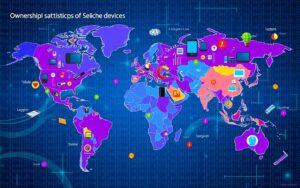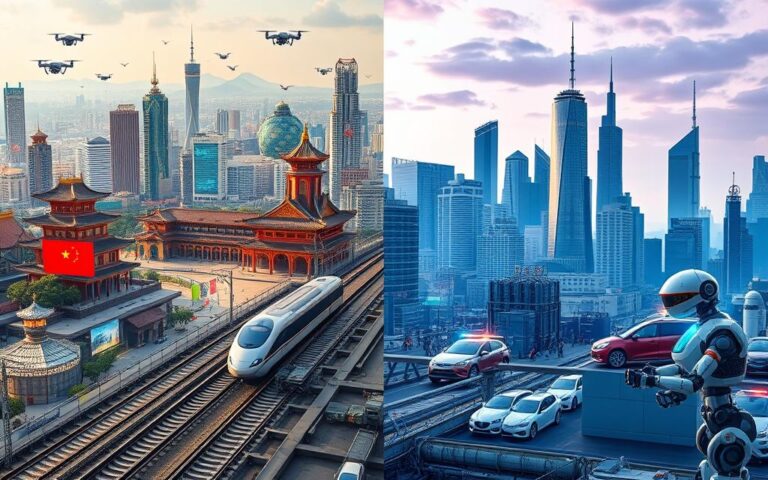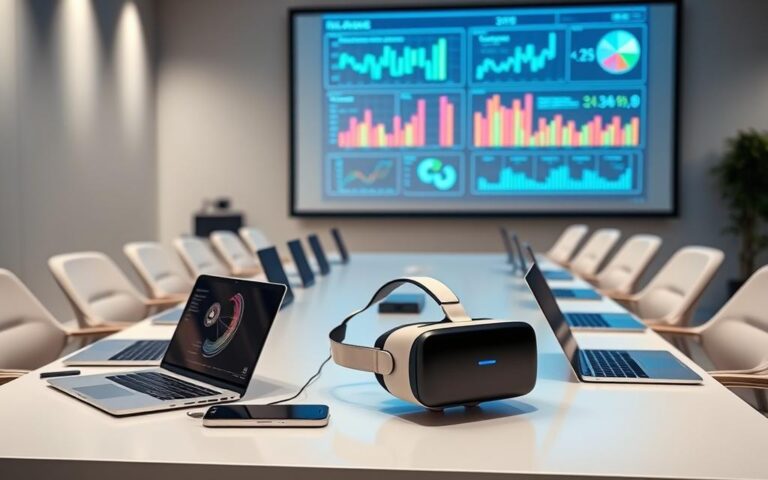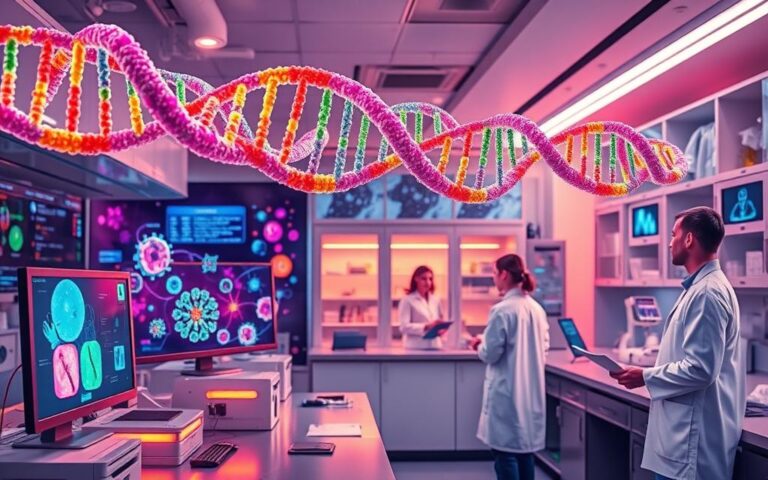How Technology Impacts Our Daily Lives
Today, in our digital age, technology seamlessly blends into our lives. Smartphones and laptops change how we work and communicate. This change started in the late 20th century and greatly affects our lives now. About 66% of people worldwide can now access the internet. This shows technology’s huge role in work and personal connections.
This article looks at technology’s many impacts. We’ll see how it improves our work and personal lives and its downsides. The perks of technology integration are vast. It makes workplaces more efficient and improves healthcare, leading us towards an innovative future.
The Ubiquity of Technology in Our Lives
Technology is now a core part of our daily lives, changing the way we interact, work, and relax. By the end of 2019, over 4.57 billion people, or 59% of the world, were online. On average, users spend 6 hours and 42 minutes online each day, with half of this time on mobile devices. The emergence of digital natives has shifted cultural norms and behaviours.
Younger people are especially tied to technology. In the UK, teens aged 16 to 24 use the Internet for about 34.3 hours weekly. This heavy use sparks concerns over mental health and social skills, as early screen time can affect a child’s development. Social media, in particular, links to shifts in brain development related to emotions in adolescents.
The workplace has evolved with technology too. Cloud computing and online collaboration have made work more flexible, mixing home and office life. This change shows how technology blends into every aspect of life. Understanding tech’s effects is key to a balanced lifestyle. For more information, discover the impacts of technology on mental health.
Positive Impacts of Technology
Technology brings clear benefits to many areas of life. In education, it lets students attend lectures and join discussions from home. This makes learning and working from home more efficient.
Thanks to e-learning platforms, students can do their work without going to campus. This saves them a lot of time and effort.
In healthcare, technology has led to big improvements. It helps doctors diagnose more accurately and treat patients better. Thanks to technology, healthcare workers can access patient records easily. This improves communication.
Telemedicine is a great example. It allows people to consult doctors without travelling.
Technology also connects us globally. Through social media and messaging apps, we can chat with anyone, anywhere. It’s especially important today. It helps people work together and share knowledge across different cultures.
However, it’s important to use technology wisely. Despite the distractions and potential problems, finding a good balance is key. This way, we get the most out of technology.
How Technology Affects Daily Life
Technology significantly shapes our daily lives, changing how we work and look after our health. It boosts efficiency, transforms communication, and affects personal connections. By understanding these shifts, we can appreciate the benefits of technology and consider its implications.
Impact on Workplace Efficiency
Technology has revolutionised the way businesses operate, leading to greater efficiency. Business analytics provide insights into customer behaviour, enhancing performance. Meanwhile, tools for productivity support teamwork, even from afar.
Communication platforms like Slack and Microsoft Teams streamline discussions, speeding up decisions. Such tools help businesses run smoothly and stay ahead in the market.
Advancements in Medical Technologies
Telemedicine, a medical breakthrough, has improved patient care significantly. It allows patients to consult doctors without visiting them. This is especially useful for those living in distant areas.
With AI in diagnostics, treatments have become more accurate. Consequently, patients enjoy better health outcomes.
Enhancing Global Communication
Thanks to digital technology, connecting with others worldwide has never been easier. The internet, social media, and messaging apps help people stay in touch, regardless of distance.
This connectivity leads to cultural exchanges, enriching our lives and broadening our perspectives. Now, about 66 percent of people globally are online, showing how interconnected we’ve become.
Negative Impacts of Technology
Technology boosts our lives but also brings big challenges. Digital distractions are everywhere, from endless notifications to social media. They harm our ability to concentrate, lowering our attention spans. Studies show our focus has dropped from 12 seconds to just eight since 2000. This decrease affects how well we work.
Everyday Distractions in a Tech-Driven World
Digital devices are everywhere, causing many distractions. Teens spend about nine hours a day on screens. Younger kids, aged eight to twelve, use them for four to six hours. This much screen time hurts self-esteem and leads to more obesity in kids. It also makes staying active harder.
These distractions do more than just harm attention. They make it tough to concentrate and can make us feel alone. People on social media a lot tend to feel more isolated. In fact, they are three times more likely to feel lonely than those who use it less.
Concerns Over Privacy and Data Breaches
The growth of technology has made privacy a big worry. News often reports data breaches, risking identity theft and privacy issues for millions. Hackers can misuse personal data online. This raises serious concerns about the safety of our information. With more reliance on digital tools, the threat of financial fraud grows.
This situation shows we need strong safety steps. Everyone must be careful online. Technology connects us in many ways. But not looking after our privacy can lead to big problems for us all.
The Role of Technology in Personal Life
Technology greatly influences our personal lives. It’s a part of daily activities and affects how we connect with others. About 66% of people worldwide can access the internet now. This makes it easier than ever to stay in touch. Social media, like Facebook and Instagram, provides new ways to connect digitally.
Smartphones, tablets, and laptops integrate technology into our daily lives. They make it easy to keep in touch with loved ones. They also change how we spend leisure time, connecting us in ways we couldn’t before. In the US, nearly 70% believe the internet improves relationships. This shows the significance of tech in keeping us connected.
Technology helps us build stronger relationships. With video calls and instant messages, we can communicate instantly, no matter the distance. However, some people worry about the downsides. They fear security issues and less in-person time could weaken relationships.
Online dating apps and digital advice have changed relationships too. They offer support and matchmaking based on preferences. But, spending too much time online can cause problems like jealousy. Using technology wisely can lead to healthier relationships. It adds value to our everyday lives.
Learning more about technology’s role can be enlightening. Courses at places like Walden University offer insights into these changes. To understand technology’s importance better, click here.
Balancing Technology Use in Daily Routines
Finding the right balance with technology is key to better well-being. It helps avoid the downsides of too much screen time. Nowadays, kids are raised around gadgets, making it essential to teach mindful tech use. Setting limits on tech improves daily life and how we connect with others.
It’s important to have times without screens, like during meals and before bed. This builds healthy habits and strengthens relationships within families. Such practices not only encourage closeness but also prevent the loneliness that too much tech can cause.
In schools, keeping an eye on tech use is crucial. Technology in classrooms allows for custom lessons and quick feedback but can distract. Teachers need to be comfortable with tech and should get training to use it effectively. The SAMR Model is a good way to use technology that enhances learning without replacing real-world activities.
Schools ought to focus on keeping kids engaged without over-relying on gadgets. This approach ensures children learn well and stay in touch with classmates in person. The National Institutes of Health have shown the risks of too much screen time, highlighting the importance of various activities.
Using mindful tech use starts with educational apps and fostering creativity. It’s also crucial to have tech rules, especially for younger kids, as the American Academy of Pediatrics advises. Ultimately, balancing tech use lets it enhance our lives, not take over.
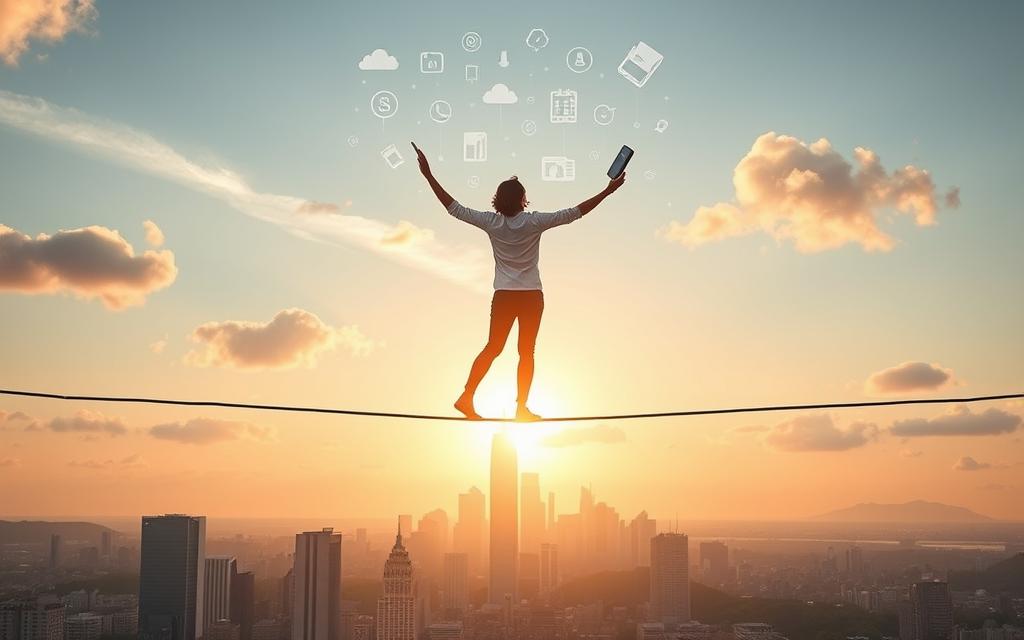
Conclusion
Technology has become a core part of our lives. It brings huge benefits and some challenges. We can now access lots of information and work together in new ways. Health advances have also improved our well-being. But, we must not ignore the downsides like privacy concerns and less face-to-face time with others.
It’s crucial to find a balanced way to use technology. Being mindful and setting limits can help us get the most from it, without getting distracted. The way we deal with technology today will influence how future generations use it. It will also affect our social norms and daily habits.
So, it’s important to embrace technology’s good points while being careful of its negatives. Moving forward with care will make sure technology helps, not hinders, our lives.
FAQ
How has technology impacted our daily lives?
Technology has changed our everyday lives massively. It is now part of work, how we talk, and socialize. It has changed how we do tasks, get information, and connect.
What are some benefits of technology in the workplace?
Technology in the workplace makes us more productive. It improves how we communicate and lets us work from anywhere. Using tools like project management software saves time in making decisions.
How does technology affect healthcare?
Healthcare has seen big improvements thanks to technology. Things like AI in diagnostics and telemedicine make treatments more accurate. This lets patients get help quickly and try new solutions from home.
What are the negative impacts of technology?
Technology can distract us a lot. It causes privacy worries and might make us lose focus. Too much screen time can mix up our work and personal time, causing stress.
What strategies can help maintain a balance in technology use?
Balance in technology use comes from setting limits. Like having times without screens. It’s good to be mindful about how we use tech. Taking regular breaks helps us connect more with others.
How has technology influenced personal relationships?
Technology keeps personal relationships going. With social media and texting, we can stay close to people far away. But it also might make us choose digital chats over meeting in person.
What role do digital communication technologies play in global connectivity?
Digital technologies bring the world closer. They help us share ideas and work together, no matter the distance. This promotes cultural exchanges and helps us understand different global views.
What are the privacy concerns associated with technology use?
Privacy worries grow as more data is shared online. This can lead to identity theft and other frauds. It’s important to be careful with our info and follow safety tips online.

